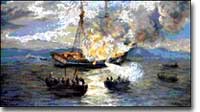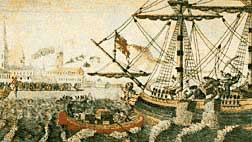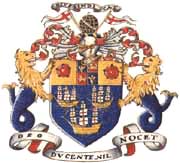9f. The Tea Act and Tea Parties

The Gaspee was burned by colonists angry about taxes and British harassment of their ships.
The British were in a spot — all because of tea.
The partial repeal of the Townshend Acts did not bring the same reaction in the American colonies as the repeal of the Stamp Act. Too much had already happened. Not only had the Crown attempted to tax the colonies on several occasions, but two taxes were still being collected — one on sugar and one on tea.
Military occupation and bloodshed, whether intentional or not, cannot be forgotten easily. Although importation had largely been resumed, the problems of customs officers continued. One ill-fated customs ship, the Gaspee, was burnt to ashes by angry Rhode Islanders when the unfortunate vessel ran aground. Tensions mounted on both sides. It would take time for wounds to heal. But Parliament would not give that time.
Playing Monopoly

The British East India Company was on the brink of financial collapse. Lord North hatched a scheme to deal simultaneously with the ailing corporation and the problem of taxing the colonies. He decided to grant the British East India Company a trading monopoly with the American colonies.
A tax on tea would be maintained, but the company would actually be able to sell its tea for a price that was lower than before. A monopoly doesn't allow for competition. As such the British East India Company could lower its prices.
The Tea Act, 1773
WHEREAS by an act, made in the twelfth year of his present Majesty's reign, (intituled, An act for granting a drawback of part of the customs upon the exportation of tea to Ireland, and the British dominions in America; for altering the drawback upon foreign sugars exported from Great Britain to Ireland; for continuing the bounty on the exportation of British-made cordage; for allowing the importation of rice from the British plantations into the ports of Bristol, Liverpoole, Lancaster, and Whitehaven, for immediate exportation to foreign parts; and to impower the chief magistrate of any corporation to administer the oath, and grant the certificate required by law, upon the removal of certain goods to London, which have been sent into the country for sale;) it is amongst other things, enacted, That for and during the space of five years, to be computed from and after the fifth day of July, one thousand seven hundred and seventy-two, there shall be drawn back and allowed for all teas which shall be sold after the said fifth day of July, one thousand seven hundred and seventy-two, at the publick sale of the united company of merchants of England trading to the East Indies, or which after that time shall be imported, by licence, in pursuance of the said therein and hereinafter mentioned act, made in the eighteenth year of the reign of his late majesty King George the Second, and which shall be exported from this kingdom, as merchandise, to Ireland, or any of the British colonies or plantations in America, three-fifth parts of the several duties of customs which were paid upon the importation of such teas; which drawback or allowance, with respect to such teas as shall be exported to Ireland, shall be made to the exporter, in such manner, and under such rules, regulations, securities, penalties, and forfeitures, as any drawback or allowance was then payable, out of the duty of customs upon the exportation of foreign goods to Ireland; and with respect to such teas as shall be exported to the British colonies and plantations in America, the said dreawback or allowance shall be made in such manner, and under such rules, regulations, penalties, and forfeitures, as any drawback or allowance payable out of the duty of customs upon foreign goods exported to foreign parts, was could, or might be made, before the passing of the said act of the twelfth year of his present Majesty's reign, (except in such cases as are otherwise therein provided for:) and whereas it may tend to the benefit and advantage of the trade of the said united company of merchants of England trading to the East Indies, if the allowance of the drawback of the duties of customs upon all teas sold at the publick sales of the said united company, after the tenth day of May, one thousand seven hundred and seventy-three, and which shall be exported from this kingdom, as merchandise, to any of the British colonies or plantations in America, were to extend to the whole of the said duties of customs payable upon the importation of such teas; may it therefore please your Majesty that it may be enacted; and be it enacted by the King's most excellent majesty, by and with the advice and consent of the lords spiritual and temporal, and commons, in this present parliament assembled, and by the authority of the same, That there shall be drawn back and allowed for all teas, which, from and after the tenth day of May, one thousand seven hundred and seventy-three, shall be sold at the publick sales of the said united company, or which shall be imported by licence, in pursuance of the said act made in the eighteenth year of the reign of his late majesty King George the Second, and which shall, at any time hereafter, be exported from this kingdom, as merchandise, to any of the British colonies or plantations in America, the whole of the duties of customs payable upon the importation of such teas; which drawback or allowance shall be made to the exporter in such manner, and under such rules, regulations, and securities, and subject to the like penalties and forfeitures, as the former drawback or allowance granted by the said recited act of the twelfth year of his present Majesty's reign, upon tea exported to the said British colonies and plantations in America was, might, or could be made, and was subject to by the said recited act, or any other act of parliament now in force, in as full and ample manner, to all intents and purposes, as if the several clauses relative thereto were again repeated and re-enacted in this present act.
II. And whereas by one other act made in the eighteenth year of the reign of his late majesty King George the Second, (intituled, An act for repealing the present inland duty of four shillings per pound weight upon all tea sold in Great Britain; and for granting to his Majesty certain other inland duties in lieu thereof; and for better securing the duty upon tea, and other duties of excise; and for pursuing offenders out of one county into another,) it is, amongst other things, enacted, That every person who shall, at any publick sale of tea made by the united company of merchants of England trading to the East Indies, be declared to be the best bidder for any lot or lots of tea, shall, within three days after being so declared the best bidder or bidders for the same, deposit with the said united company, or such clerk or officer as the said company shall appoint to receive the same, forty shillings for every tub and for every chest of tea; and in case any such person or persons shall refuse or neglect to make such deposit within the time before limited, he, she, or they, shall forfeit and lose six times the value of such deposit directed to be made as aforesaid, to be recovered by action of debt, bill, plaint, or information, in any of his Majesty's courts of record at Westminster, in which no essoin, protection, or wager of law, or more than one imparlance, shall be allowed; one moiety of which forfeiture shall go to his Majesty, his heirs and successors, and the other moiety to such person as shall sue or prosecute for the same; and the sale of all teas, for which such deposit shall be neglected to be made as aforesaid, is thereby declared to be null and void, and such teas shall be again put up by the said united company to publick sale, within fourteen days after the end of the sale of teas at which such teas were sold; and all and every buyer or buyers, who shall have neglected to make such deposit as aforesaid, shall be, and is and are thereby rendered incapable of bidding for or buying any teas at any future publick sale of the said united company: and whereas it is found to be expedient and necessary to increase the deposit to be made by any bidder or bidders for any lot or lots of bohea teas, at the publick sales of teas to be made by the said united company; be it enacted by the authority aforesaid, That every person who shall, after the tenth day of May, one thousand seven hundred and seventy-three, at any publick sale of tea to be made by the said united company of merchants of England trading to the East Indies, be declared to be the best bidder or bidders for any lot or lots of bohea tea, shall, within three days after being so declared the best bidder or bidders for the same, deposit with the said united company, or such clerk or officer as the said united company shall appoint to receive the same, four pounds of lawful money of Great Britain for every tub and for every chest of bohea tea, under the same terms and conditions, and subject to the same forfeitures, penalties, and regulations, as are mentioned and contained in the said recited act of the eighteenth year of the reign of his said late Majesty.
III. And be it further enacted by the authority aforesaid, That it shall and may be lawful for the commissioners of his Majesty's treasury, or any three or more of them, or for the high treasurer for the time being, upon application made to them by the said united company of merchants of England trading to the East Indies for that purpose, to grant a licence or licences to the said united company, to take out of their warehouses, without the same having been put up to sale, and to export to any of the British plantations in America, or to any parts beyond the seas, such quantity or quantities of tea as the said commissioners of his Majesty's treasury, or any three or more of them, or the high treasurer for the time being, shall think proper and expedient, without incurring any penalty or forfeiture for so doing; any thing in the said in part recited act, or any other law, to the contrary notwithstanding.
IV. And whereas by an act made in the ninth and tenth years of the reign of King William the Third, (intituled, An act for raising a sum not exceeding two millions, upon a fund, for payment of annuities, after the rate of eight pounds per centum per annum; and for settling the trade to the East Indies,) and by several other acts of parliament which are now in force, the said united company of merchants of England trading to the East Indies are obliged to give security, under their common seal, for payment of the duties of customs upon all unrated goods imported by them, so soon as the same shall be sold; and for exposing such goods to sale, openly and fairly, by way of auction, or by inch of candle, within the space of three years from the importation thereof: and whereas it is expedient that some provision should be made to permit the said company, in certain cases, to export tea, on their own account, to the British plantations in America, or to foreign parts, without exposing such tea, to sale here, or being charged with the payment of any duty for the same; be it therefore enacted by the authority aforesaid, That from and after the passing of this act, it shall and may be lawful for the commissioners of his Majesty's treasury, or any three or more of them, or the high treasurer for the time being, to grant a licence or quantity of licences to the said united company, to take out of their warehouses such quantity or quantities of tea as the said commissioners of the treasury, or any three or more of them, or the high treasurer for the time being, shall think proper, without the same having been exposed to sale in this kingdom; and to export such tea to any of the British colonies or plantations in America, or to foreign parts, discharged from the payment of any customs or duties whatsoever; any thing in the said recited act, or any other act to the contrary notwithstanding.
V. Provided always, and it is hereby further enacted by the authority aforesaid, That a due entry shall be made at the custom-house, of all such tea so exported by licence, as aforesaid, expressing the quantities thereof, at what time imported, and by what ship; and such tea shall be shipped for exportation by the proper officer for that purpose, and shall, in all other respects, not altered by this act, be liable to the same rules, regulations, restrictions, securities, penalties, and forfeitures, as tea penalties, &c. exported to the like places was liable to before the passing this act: and upon the proper officer's duty, certifying the shipping of such tea to the collector and comptroller of his Majesty's customs for the port of London, upon the back of the licence, and the exportation thereof, verified by the oath of the husband or agent for the said united company, to be wrote at the bottom of such certificate, and sworn before the said collector and comptroller of the customs, (which oath they are hereby impowered to administer,) it shall and may be lawful for such collector and comptroller to write off and discharge the quantity of tea so exported from the warrant of the respective ship in which such tea was imported.
VI. Provided nevertheless, That no such licence shall be granted, unless it shall first be made to appear to the satisfaction of the commissioners of his Majesty's treasury, or any three or more of them, or the high treasurer for the time being, that at the time of taking out such teas, for the exportation of which licence or licences shall be granted, there will be left remaining in the warehouses of the said united company, a quantity of tea not less than ten millions of pounds weight; any thing herein, or in any other act of parliament, contained to the contrary thereof notwithstanding.
– The Tea Act (1773)

The British East India Company began with a royal charter from Queen Elizabeth in 1600 and developed into an economic powerhouse. When the company faced financial ruin during the 1770s, the British government stepped in with the Tea Act to help the struggling company.
The colonists, Lord North hoped, would be happy to receive cheaper tea and willing to pay the tax. This would have the dual result of saving the tea company and securing compliance from Americans on the tax issue. It was a brilliant plan. There was, of course, one major flaw in his thinking.
The colonists saw through this thinly veiled plot to encourage tax payment. Furthermore, they wondered how long the monopoly would keep prices low.
Activists were busy again, advocating boycott. Many went further. British ships carrying the controversial cargo were met with threats of violence in virtually all colonial ports. This was usually sufficient to convince the ships to turn around. In Annapolis, citizens burned a ship and the tea it carried.
Boston, of course, reacted in a similarly extreme fashion.
The Boston Tea Party
Governor Thomas Hutchinson allowed three ships carrying tea to enter Boston Harbor. Before the tax could be collected, Bostonians took action. On a cold December night, radical townspeople stormed the ships and tossed 342 chests of tea into the water. Disguised as Native Americans, the offenders could not be identified.
|
I dressed myself in the costume of an Indian,equipped with a small hatchet, which I and my associates denominated the tomahawk, with which, and a club, after having painted my face and hands with coal dust in the shopof a blacksmith, I repaired to Griffin's wharf,where the ships lay that contained the tea... We then were ordered by our commander to open the hatches and take out all the chests of tea and throw them overboard, and we immediately proceeded to execute his orders, first cutting and splitting the chests with our tomahawks, so as thoroughly to expose them to the effects of the water. In about three hours from the time we went on board, we had thus broken and thrown overboard every tea chest to be found in the ship, while those in the other ships were disposing of the tea in the same way, at the same time. We were surrounded by British armed ships, but no attempt was made to resist us. – Anonymous, "Account of the Boston Tea Party by a Participant," (1773) | ||
The damage in modern American dollars exceeded three quarters of a million dollars. Not a single British East India Company chest of tea bound for the 13 colonies reached its destination. Not a single American colonist had a cup of that tea.
Only the fish in Boston Harbor had that pleasure.







